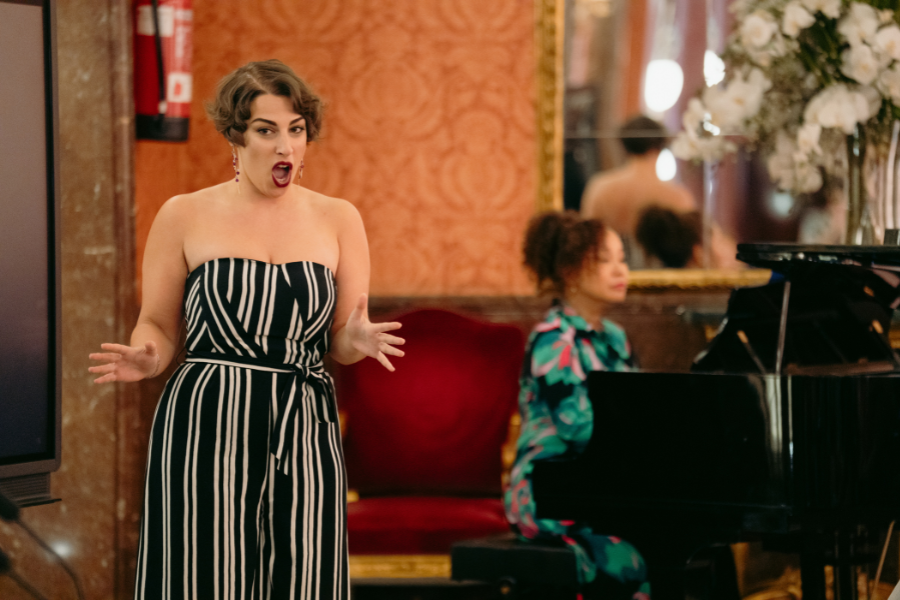El Teatro de la Zarzuela recupera la ópera ‘Circe’ de Ruperto Chapí más de un siglo después de que el público la escuchara por última vez

La dirección musical correrá a cargo de Guillermo García Calvo, director musical del Teatro.
La partitura, enormemente exigente, será interpretada por un reparto escogido especialmente para abordar sus excepcionales características, integrado por Saioa Hernández, Alejandro Roy, Rubén Amoretti y Marina Pinchuk.
A pesar de que en el estreno de 1902 muchos consideraron la ópera como “cimiento y base de la opera española”,cayó en el olvido. No volvió a ser programada. No se volvió a escuchar.
La grabación que Radio Clásica efectuará de una de las dos sesiones, será histórica ya que no existe registro sonoro alguno de la obra.
El año próximo se cumplirán 120 del estreno de ‘Circe’, la grandiosa ópera de Ruperto Chapí que en 1902 inauguró con más de veinte funciones el desaparecido Teatro Lírico, un Titanic absoluto del género, el más grande recinto lírico habido en Madrid. Diez años después, ‘Circe’ viajó a Buenos Aires para conquistar asimismo al público del Teatro Colón; suerte inmensa –cuyo verdadero alcance todos ignoraban– la de los espectadores de una y otra orilla que tuvieron la ocasión de asistir a alguna de esas representaciones.
Y es que a partir de ahí, la historia fue muy distinta: ‘Circe’, la obra que muchos consideraron «cimiento y base de la ópera española», cayó en un olvido total e inconcebible –no volvió a representarse, no se volvió a escuchar– del que ahora el Teatro de la Zarzuela la rescata para que el público de 2021 también pueda alimentarse con aquella composición que giró hacia donde nadie había osado (o sabido). Para admirar a un Chapí hasta la fecha (de entonces y de ahora) desconocido. Los días 10 y 12 de septiembre (20h00 y 18h00 respectivamente) el Teatro de la plazuela de Jovellanos presentará en versión de concierto esta obra hoy absolutamente “nueva”.
De esta manera el coliseo cumple una vez más con las exigencias irrenunciables recogidas en sus estatutos como son la preservación, la recuperación, la revisión y la difusión de nuestro patrimonio lírico. Estos son los obligados cometidos que el Teatro cumple minuciosamente cada temporada al menos por partida doble.
‘Circe’, con libreto de Miguel Ramos Carrión, se estrenó en el Teatro Lirico de Madrid el 7 de mayo de 1902, y como indica el musicólogo Emilio Casares, uno no puede acercarse a ella con el mismo espíritu con que se acude a un oír ‘La traviata’ o ‘Doña Francisquita’. “Más bien hay que pensar en cualquiera de los dramas de Wagner o en el ‘Pelléas et Mélisande’ de Debussy”, afirma el experto, quien explica que ‘Circe’ no se define por las grandes arias, dúos o números concertantes —no tiene números—, “sino como un drama musical continuo, donde música, texto, y visualidad actúan en conjunto”. Como un todo absoluto.
Los dos conciertos que ahora hacen justicia a la obra, estarán dirigidos por Guillermo García Calvo, director musical del Teatro de la Zarzuela, quien al frente de la Orquesta Titular de este, la ORCAM, y de su Coro Titular dirigido por Antonio Fauró, deberá afrontar una partitura extraordinariamente exigente, escrita con una inteligencia musical fuera de lo común.
Será asimismo una ocasión única para complacerse con un reparto muy acorde a las necesidades que solicita una obra de estas características, integrado por Saioa Hernández, Alejandro Roy, Rubén Amoretti y Marina Pinchuk en sus papeles protagonistas.
La grabación que Radio Clásica efectuará de una de las dos sesiones, puede considerarse como histórica, ya que será el primer registro sonoro de la obra.
En las funciones del estreno de ‘Circe’ la aclamación fue in crescendo hasta lograr un entusiasmo unánime, y eso que Chapí no dirigió su trabajo a atraer al público de siempre, pensado en grandes números que han de terminar con el consabido aplauso. Como nos desvela Emilio Casares, “las bellezas saltan a la vista pero de otra manera, con una orquestación siempre rica, con numerosos momentos transicionales, con un magistral trabajo motívico, o por su colorismo. No hay sitios para las grandes cadenzas, o para momentos de fioritura”.
El maestro García Calvo señala al respecto que ‘Circe’ es “una ópera histórica, europea en el estilo de la ‘Elektra’ de Strauss o el ‘Edipo’ de Enescu. Una ópera que describe el ambiente mítico de La Odisea de Homero en un viaje de descubrimiento para todos”. El director muestra asimismo su admiración por Chapí aludiendo a la versatilidad de su capacidad creativa: “En cada obra que escribe parece de un nuevo compositor. Qué distinta su música”. Y de acuerdo a esta idea concluye: “El de ‘Circe’ es un Chapí absolutamente desconocido”





